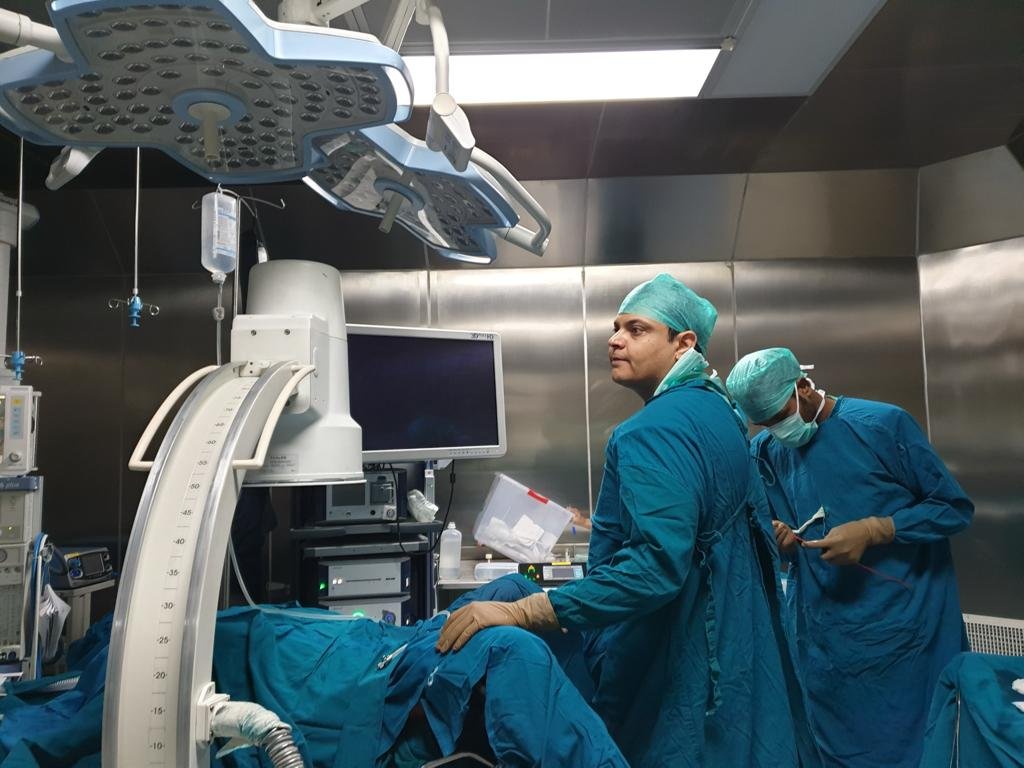Kidney Cancer
- Home
- Kidney Cancer
Overview
Kidney cancer begins in the kidneys. Your kidneys are two bean-shaped organs, each about the size of your fist. They’re located behind your abdominal organs, with one kidney on each side of your spine. In adults, renal cell carcinoma is the most common type of kidney cancer — about 90 percent of cancerous tumors. Other less common types of kidney cancer can occur. Young children are more likely to develop a kind of kidney cancer called Wilms’ tumor. The incidence of kidney cancer seems to be increasing. One reason for this may be the fact that imaging techniques such as computerized tomography (CT) scans are being used more often. These tests may lead to the accidental discovery of more kidney cancers. In many cases, kidney cancer is found at an early stage, when the tumors are small and confined to the kidney, making them easier to treat.

Dr.Himesh Gandhi - Robotic Uro-Onco Surgeon
Symptoms
Kidney cancer rarely causes signs or symptoms in its early stages. And currently there are no routine tests used to screen for kidney cancer in the absence of symptoms. In the later stages, kidney cancer signs and symptoms may include:
- Blood in your urine, which may appear pink, red or cola colored
- Pain in your back or side that doesn’t go away
- Loss of appetite
- Unexplained weight loss
- Tiredness
- Fever, which usually comes and goes (intermittent)
Risk factors
Factors that can increase the risk of kidney cancer include :
- Older age. Your risk of kidney cancer increases as you age.
- Smoking. Smokers have a greater risk of kidney cancer than nonsmokers do. The risk decreases after you quit.
- Obesity:People who are obese have a higher risk of kidney cancer than people who are considered average weight.
- High blood pressure (hypertension): High blood pressure increases your risk of kidney cancer.
- Treatment for kidney failure:People who receive long-term dialysis to treat chronic kidney failure have a greater risk of developing kidney cancer.
- Certain inherited syndromes:People who are born with certain inherited syndromes may have an increased risk of kidney cancer, such as those who have von Hippel-Lindau disease, Birt-Hogg-Dube syndrome, tuberous sclerosis complex, hereditary papillary renal cell carcinoma or familial renal cancer.
- Family history of kidney cancer:Even in the absence of an inherited syndrome, people who have a strong family history of renal cell cancer have a greater risk of kidney cancer.
- Exposure to certain substances in the workplace:This might include, for example, exposure to cadmium or specific herbicides.
Causes
It’s not clear what causes renal cell cancer, the most common form of kidney cancer, though there are several risk factors.Doctors know that kidney cancer begins when some kidney cells acquire mutations in their DNA. The mutations tell the cells to grow and divide rapidly. The accumulating abnormal cells form a tumor that can extend beyond the kidney. Some cells can break off and spread (metastasize) to distant parts of the body.
Prevention
Taking steps to improve your health may help reduce your risk of kidney cancer. To reduce your risk, try to:
-
Quit smoking :
If you smoke, quit. Many options for quitting exist, including support programs, medications and nicotine replacement products. Tell your doctor you want to quit, and discuss your options together.
-
Maintain a healthy weight :
Work to maintain a healthy weight. If you’re overweight or obese, reduce the number of calories you consume each day and try to be physically active most days of the week. Ask your doctor about other healthy strategies to help you lose weight.
-
Control high blood pressure :
Ask your doctor to check your blood pressure at your next appointment. If your blood pressure is high, you can discuss options for lowering your numbers. Lifestyle measures such as exercise, weight loss and diet changes can help. Some people may need to add medications to lower their blood pressure. Discuss your options with your doctor.